 Petzlover
Petzlover Long Haired Chihuahua is originated from Mexico but Shiloh Shepherd is originated from United States. Long Haired Chihuahua may grow 7 cm / 2 inches shorter than Shiloh Shepherd. Long Haired Chihuahua may weigh 62 kg / 136 pounds lesser than Shiloh Shepherd. Long Haired Chihuahua may live 6 years more than Shiloh Shepherd. Long Haired Chihuahua may have less litter size than Shiloh Shepherd. Long Haired Chihuahua requires Moderate Maintenance. But Shiloh Shepherd requires High Maintenance
Long Haired Chihuahua is originated from Mexico but Shiloh Shepherd is originated from United States. Long Haired Chihuahua may grow 7 cm / 2 inches shorter than Shiloh Shepherd. Long Haired Chihuahua may weigh 62 kg / 136 pounds lesser than Shiloh Shepherd. Long Haired Chihuahua may live 6 years more than Shiloh Shepherd. Long Haired Chihuahua may have less litter size than Shiloh Shepherd. Long Haired Chihuahua requires Moderate Maintenance. But Shiloh Shepherd requires High Maintenance
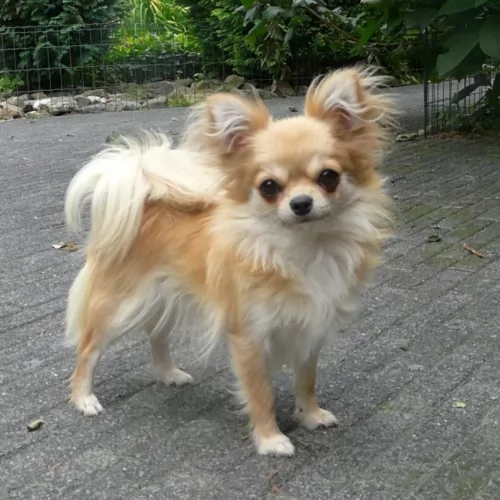 The short haired Chihuahua is such a recognizable dog breed, probably because of his tiny size, but did you know that you also get a long haired variety?
The short haired Chihuahua is such a recognizable dog breed, probably because of his tiny size, but did you know that you also get a long haired variety?
Looking quite a bit like a Pomeranian, the only difference between the two types of Chihuahua is the length of the coat.
This small dog dates back to Mayan times and while it may well have originated in Mexico, its popularity saw it becoming a sought after pet in other countries too.
To get the long haired Chihuahua, breeding programs were established and the short-haired variety was mated with other long haired toy sized dogs such as the Pomeranian and the Yorkshire Terrier.
 The Shiloh Shepherd is currently a hybrid that breeders are attempting to develop into a new breed. New York breeder, Tina Barber, out of Shiloh Shepherds kennel developed dogs when in 1974, she attempted to develop a German Shepherd line. She wanted a GSD that was more like the ones she remembered from her childhood.
The Shiloh Shepherd is currently a hybrid that breeders are attempting to develop into a new breed. New York breeder, Tina Barber, out of Shiloh Shepherds kennel developed dogs when in 1974, she attempted to develop a German Shepherd line. She wanted a GSD that was more like the ones she remembered from her childhood.
Tina took her foundation stock out of the AKC and got the FIC (Federation of International Canines) to recognize the Shiloh Shepherd as a separate breed. The FIC is not the same as the FCI or Federation Cynoloquque Internationale. In 1991 the Shiloh Shepherd Dog Club of America was formed, and the shepherd was recognized by the American Rare Breed Association.
Official recordkeeping on the breed began in 1993. The computer system TCCP maintains breed records and the Shiloh Shepherd has at least 9 generations in the system. Tina Barber was president of the Shiloh Shepherd Dog Club of America and oversaw the international club as well. She was responsible for the breed. After her death in 2011, her daughter took her place in working with the breed.
The Shiloh and the German Shepherd were then crossed to develop the King Shepherd.
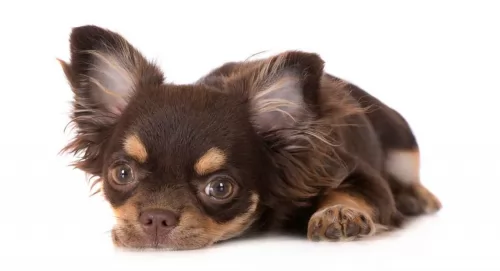 Your long haired Chihuahua will have a coat that is soft and slightly wavy. He weighs between 1 and 3kg and stands at about 15 – 23cm. He generally sheds throughout the year with a couple of heavier shedding periods during the year.
Your long haired Chihuahua will have a coat that is soft and slightly wavy. He weighs between 1 and 3kg and stands at about 15 – 23cm. He generally sheds throughout the year with a couple of heavier shedding periods during the year.
Don’t be fooled by the long, thick hair on the long haired Chihuahua as it doesn’t protect him from the cold – in fact he doesn’t tolerate the cold well at all, and is essentially an indoor dog. The ears are erect and feathery and the tail is full and plumed, lying over the back. He has a ruff on the neck, which is often described as a mane.
Chihuahuas are such bright-as-a-button little dogs and they’re intelligent too.
It’s difficult to say how a dog’s temperament will turn out, because breed, lifestyle and the type of owners can all make a dog a certain way.
Socialization and training can sometimes help with a dog that has bad genes. There are some people who say the Long haired Chihuahua is a nasty, aggressive little dog who’ll easily give you a nip but they’ve got a good reputation with many other dog lovers.
They love their own human family but may take quite a while to chill towards other people and other dogs too. They’re more ‘birds of a feather flock together’ type of dogs, preferring to get on with other Chihuahua dogs.
 Shiloh Shepherds are giant dogs, much larger than the usual German Shepherd Dog. The Shiloh had been bred to be a companion animal and not a guardian or herder. The Shiloh looks more like a wolf than either the German or the King Shepherd Dog. Their back is straighter than the GSD and they are larger, more stable and more intelligent. They were bred to show a complimentary balance between strength and elegance.
Shiloh Shepherds are giant dogs, much larger than the usual German Shepherd Dog. The Shiloh had been bred to be a companion animal and not a guardian or herder. The Shiloh looks more like a wolf than either the German or the King Shepherd Dog. Their back is straighter than the GSD and they are larger, more stable and more intelligent. They were bred to show a complimentary balance between strength and elegance.
They have slightly domed, broad heads with a muzzle that gradually tapers, strong cheekbones and black lips. Their ears are triangles, well cupped and firm. The Shiloh Shepherds eyes are either brown or very dark. They have a straight back which is muscular and broad. Their chests deep and their tails plush, long and curved.
They have a very “heavy” appearance compared with other shepherds. They are well muscled in both the lower and upper thighs. Their coat is plush, and they have a dense undercoat. Their hair is harsh to the touch. There is both a smooth coat and a plush coat with the plush coat being more prevalent.
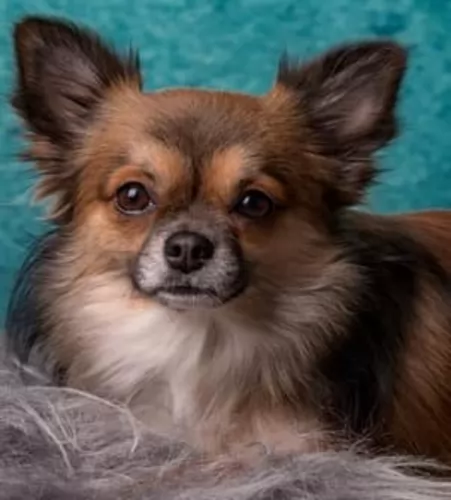 The Chihuahua is such a feisty, courageous, confident little dog who also believes that he is part- lion. He is loving, sweet and gentle and just loves being picked up and petted non-stop. He looks up at you, moving his front paws up and down to tell you that he wants to be picked up.
The Chihuahua is such a feisty, courageous, confident little dog who also believes that he is part- lion. He is loving, sweet and gentle and just loves being picked up and petted non-stop. He looks up at you, moving his front paws up and down to tell you that he wants to be picked up.
He is in 7th heaven when he can be cuddled up in your lap. You just have to teach your children to be very careful with him and not enter into games with him that are too rough and tumble. Tiny he may be but he makes a great watchdog too, barking and alerting you to strangers.
His small size makes him perfect for life in the city or in the countryside. Just be careful when in the countryside lest an Eagle or Owl scoop him up and carry him off to some faraway nest.
He doesn’t need a great deal of exercise either and you can actually keep him happily busy with some games indoors. He’ll always welcome walks with you though.
This small dog is full of life and confidence and he is ready to be your constant, loving companion.
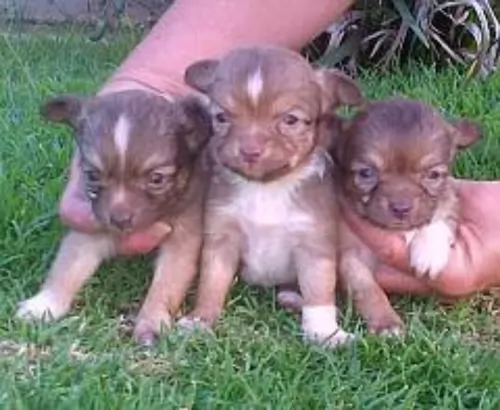 With good care, you’ll have your long haired Chihuahua with you for a long time – 15 years and longer.
With good care, you’ll have your long haired Chihuahua with you for a long time – 15 years and longer.
Make sure to de-worm your Chihuahua. Worms and other parasites can be deadly for your pet and the vet will do preventative deworming on a regular basis.
You Chihuahua will need to be vaccinated when he is a puppy and even when he is an adult, although less often. These vaccines will protect your Chihuahua from the likes of parvo, distemper and rabies. Have your chihuahua spayed or neutered.
There are so many puppies in the world who can’t find homes. Desexing your Chihuahua is a responsible way to ensure your pet doesn’t have puppies. Spaying and neutering can actually be beneficial for your dog’s health.
 The Shiloh Shepherd has some health issues to deal with. These include: They seem to have very sensitive stomachs and intestinal issues.
The Shiloh Shepherd has some health issues to deal with. These include: They seem to have very sensitive stomachs and intestinal issues.
• Bloat – gastric dilatca ation volvulus – twisted stomach or intestines. Needs immediate veterinary care.
• Small intestine bacterial overgrowth – diarrhea, difficulty absorbing nutrients, abdominal pain.
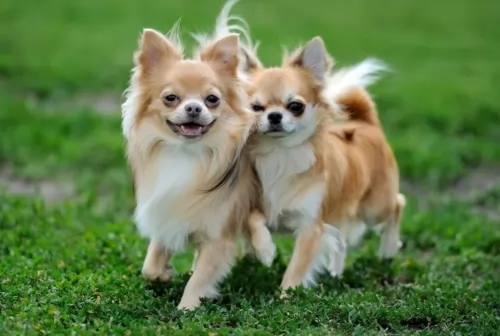 The pint-sized long-haired Chihuahua isn’t going to take up too much of your time in terms of grooming. Make sure you brush him at least twice a week to ensure his long hair doesn’t tangle. Small dogs are prone to dental problems, so try and brush his teeth at least 2 or 3 times a week with special doggy toothbrush- and toothpaste.
The pint-sized long-haired Chihuahua isn’t going to take up too much of your time in terms of grooming. Make sure you brush him at least twice a week to ensure his long hair doesn’t tangle. Small dogs are prone to dental problems, so try and brush his teeth at least 2 or 3 times a week with special doggy toothbrush- and toothpaste.
Take your puppy Chihuahua to the vet for his regular vaccinations to prevent him getting dangerous illnesses.
Feed him a high quality dog food. He is a high energy dog so buy high quality food that caters for small, lively dogs. Try and feed him such home made food from time to time. Remember that with small dogs, high-salt diets can contribute to kidney problems.
Never overfeed your Chihuahua as obesity opens up major health problems in Chihuahuas.
 1.Feeding the puppy -Due to the breed’s sensitive stomach and intestinal issues, it is important to feed the puppy a high quality large or extra-large breed of dog food. Feed at least 3 meals per day.
1.Feeding the puppy -Due to the breed’s sensitive stomach and intestinal issues, it is important to feed the puppy a high quality large or extra-large breed of dog food. Feed at least 3 meals per day.
2.Feeding the adult- You will still want to feed a high quality large or extra-large breed dog food two times a day. However, if you feed the pup well and keep the intestinal issues under control, the adult should have an easier time.
4. Games and Exercises Be careful of the puppies’ exercise levels. Their bones grow slower than most so avoid a lot of jumping or strenuous exercise until they are adults. This means that even though they will be very good at agility or flyball and they will love playing them, do not start them when they are puppies. Wait until they are mature. The do well in herding trials, agility and search and rescue. Many make great therapy dogs.